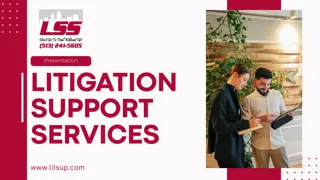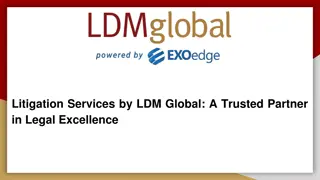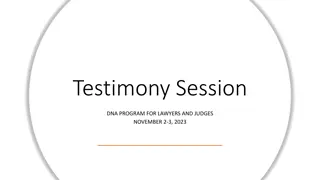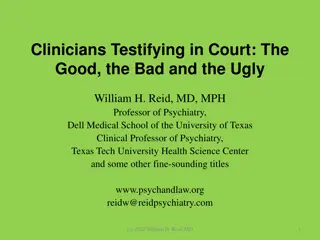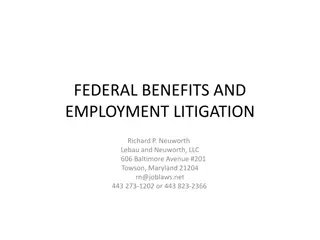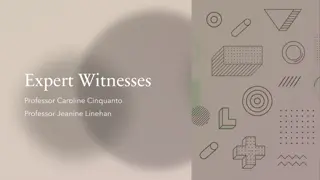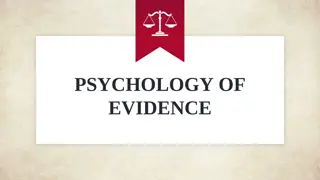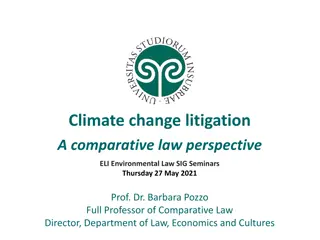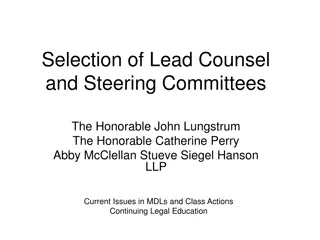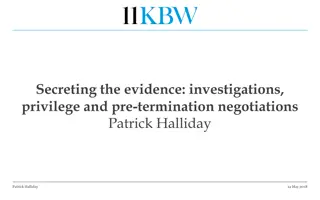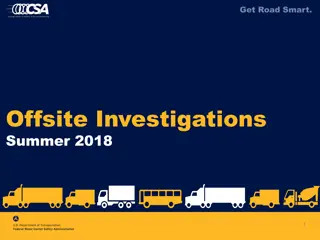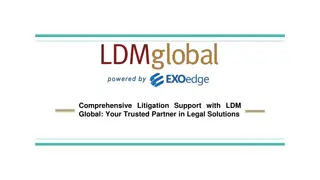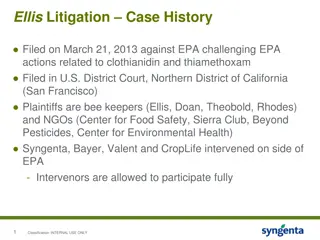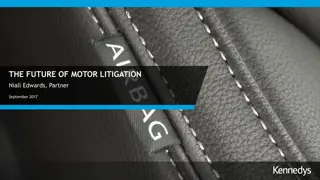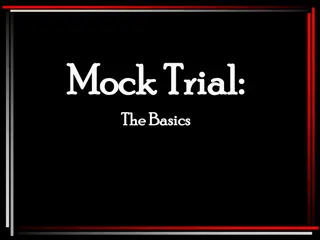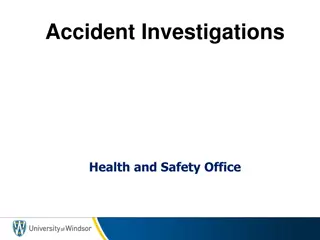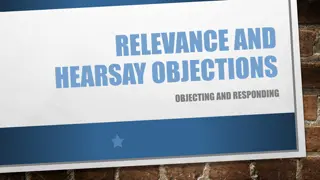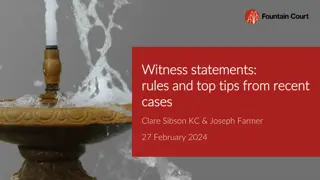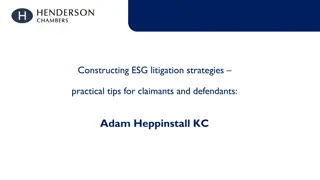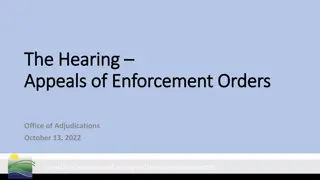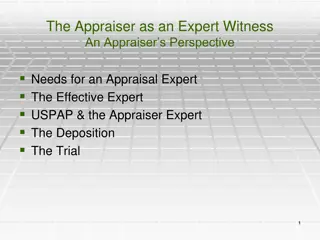Understanding Litigation Processes and Witness Testimony in Investigations
Explore the key steps in civil and criminal litigation processes, the role of expert witnesses, and the importance of investigative reports and testimony. Learn about witness responsibilities, Touhy regulations for federal employees, and the pre-trial phase in civil cases.
Download Presentation

Please find below an Image/Link to download the presentation.
The content on the website is provided AS IS for your information and personal use only. It may not be sold, licensed, or shared on other websites without obtaining consent from the author. Download presentation by click this link. If you encounter any issues during the download, it is possible that the publisher has removed the file from their server.
E N D
Presentation Transcript
Unit 8 08-1-FI210-EP
Review Unit 8 Objectives 1. Identify key steps in the civil and criminal litigation processes. 2. Explain the relationship between the investigation report and testimony. 3. Define expert witness and fact witness. 4. Describe the role of an expert witness. 5. Describe the expert witness voir dire process. 6. List the elements of a curriculum vitae. 7. List the principles an investigator should follow when testifying. 08-2-FI210-EP
DISCLAIMER & CAUTION NFPA 921 and FI-210 are only suggested guidelines; they are not required procedures. Every case will be different and requires professional judgment on what investigative techniques will be used. 08-3-FI210-EP
This Could Happen to You! Witness for prosecution. Witness for defense. Witness in lawsuit between 3rdparties that relied on your report. Check with agency as to being a witness when the agency is not a party. Many federal agencies have Touhy regulations prohibiting employees from testifying absent: Specific government interest; and With written permission of agency head. 08-4-FI210-EP
Example EPAs Touhy Regulations 40 C.F.R. 2.404 Procedures when an employee is subpoenaed: (a) Copies of subpoenas must immediately be sent to the General Counsel . . ., with the recommendations of the employee's supervisors. The General Counsel . . . . determines whether compliance with the subpoena would clearly be in the interests of EPA. . . . (b) If the General Counsel . . . denies approval to comply with the subpoena. . . the employee must appear at the stated time and place . . . , produce a copy of these regulations and respectfully refuse to provide any testimony or produce any documents. 08-5-FI210-EP
Federal Employees Acting In Official Capacity: If you receive a subpoena regarding matters within the scope of your official duties. Fact and jurisdiction driven criteria. Do not assume subpoena is valid. Do not ignore it either. Contact your supervisor and your legal staff before taking any action. 08-6-FI210-EP
The Civil Process Pre-Trial Complaint Plaintiff presents theory of case and hoped for remedy. Answer Defendant s Response. Affirmative Defenses. Discovery Both sides exchange all non-privilege relevant evidence. Over 90% of contested cases do not get past the Discovery stage. 08-7-FI210-EP
The Civil Process Discovery Interrogatories List of written questions. Requests For Production Request to produce all documentary and physical evidence. Requests for Admissions Used to narrow the contested issues in a case. 08-8-FI210-EP
The Civil Process Discovery Depositions (Examinations) Questioning is similar to trial. Direct questions and cross examination. Under oath and before a Court Reporter. No finder of fact present. Counsel s objections are for the record only (you still have to answer the question unless instructed not to answer). 08-9-FI210-EP
The Civil Process Subpoenas A command by the court to present yourself for formal questioning at a deposition or for trial. Subpoena duces tecum A command by the Court to bring with you to the above questioning all requested documentation. Know your agency s policy on responding to subpoenas. 08-10-FI210-EP
The Civil Process Trial Settlement Conference Local rules Court ordered Required by law Pre-Trial Motions Summary Judgment Dismiss Suppress evidence 08-11-FI210-EP
The Civil Process Trial Voir Dire Qualifying expert witnesses. Selecting a jury if jury trial. Opening Statements Testimony Plaintiff first, then Defendant Direct - No leading questions. Cross - Leading Questions should be limited to subject of direct. Re-Direct Damage Control. 08-12-FI210-EP
The Civil Process Trial Final Motions Closing Arguments Jury Instructions Finder of Fact (Judge or Jury) issues verdict (judgment) Appeal Appeals generally limited to issues of law, not findings of fact. Federal system mandatory mediation. 08-13-FI210-EP
The Criminal Process Pre-Trial Indictment or Information Grand jury issues indictment. Prosecutors issue an information. Charging crimes and the theory of case. Arraignment Accused pleads guilty/not guilty/nolo contendere. Discovery (Generally only Prosecutor has to share evidence and information). 08-14-FI210-EP
The Criminal Process Trial Pre-trial Motions Suppress evidence Voir Dire (selecting a jury and/or qualifying expert witnesses) Opening Statements Testimony Final Motions Jury Instructions Finder of Fact (Judge or Jury) Issues Verdict 08-15-FI210-EP
The Criminal Process Appeals Prosecutor can appeal almost any issue of law, but cannot appeal a verdict of not guilty, e.g., the Judge dismisses case without verdict. Defense can appeal any issue of law. 08-16-FI210-EP
Witnesses and Their Roles 08-17-FI210-EP 08-17-FI210-EP
Criminal Process Types of Evidence Direct ( I saw him do it ) Documents Eyewitnesses Circumstantial or indirect Proof of a chain of circumstances pointing to the existence or non-existence of certain facts. Footprints in dirt now matched shoes worn by suspect. Judicial Notice ( tires are round ) 08-18-FI210-EP
Criminal Process Fact Witnesses Testimony based on factual observations. Opinions or conclusions generally not allowed. Most cases require fact witnesses. 08-19-FI210-EP
Criminal Process Expert Witnesses Qualified by education, knowledge, skill, or experience. Allowed to draw inferences, form conclusions, and testify as to opinions. Most fire cases will require expert testimony. Trial court judge determines expert witness qualifications. In federal court, conclusions and methodology are examined using FRE 702 (Daubert) criteria. 08-20-FI210-EP
Criminal Process Federal Rules of Evidence: Rule 702 (2011 revision) A witness who is qualified as an expert by knowledge, skill, experience, training, or education may testify in the form of an opinion or otherwise if: a) the expert s scientific, technical, or other specialized knowledge will help the trier of fact to understand the evidence or to determine a fact in issue; b) the testimony is based on sufficient facts or data; c) the testimony is the product of reliable principles and methods; and d) the expert has reliably applied the principles and methods to the facts of the case. 08-21-FI210-EP
Criminal Process Daubert v. Merrell-Dow Pharmaceutical Company US Supreme Court 1993 Testimony must be relevant. Testimony must be reliable. 08-22-FI210-EP
Criminal Process Daubert v.Merrell-Dow Pharmaceuticals To determine reliability, the trial judge acting as a gatekeeper may apply many factors, including but not limited to, the following tests to decide a proffered expert testimony s reliability. Can the theory or technique be tested? Has the theory or technique been subjected to peer review? 08-23-FI210-EP
Criminal Process Daubert v.Merrell-Dow Pharmaceuticals Reliability tests (cont.) Is there a known or potential rate of error associated with this theory or technique? Does this theory or technique have a general acceptance in that particular discipline s community? 08-24-FI210-EP
Criminal Process Michigan-Miller s Mutual v. Benfield (11th circuit -1998) Fire investigation case in federal court. Tendered expert s testimony excluded: Failure to meet FRE 702 (Daubert test) standard. Did not perform any tests or take any samples. No scientific basis for opinion. 08-25-FI210-EP
Criminal Process Voir Dire: Qualifying Expert Witnesses First step in qualifying a proposed witness as an expert. Trial within a trial. Generally does not occur before jury, if a jury trial. Prosecution/plaintiff and defense counsel have significant freedom to question the proposed expert s qualifications. Expert s qualifications must be established prior to giving expert testimony. 08-26-FI210-EP
Criminal Process Voir Dire: Qualifying Expert Witnesses Prosecution/plaintiff and defense counsel establishes qualifications of their respective proposed expert witnesses. Opposing counsel cross examines to reduce credibility of proposed expert witness. Expert testimony allowed by judge if minimum Daubert qualifications are met. Some jurisdictions do not use Daubert. Trier of fact decides weight and credibility given to each expert s testimony. 08-27-FI210-EP
Criminal Process Voir Dire - Curriculum Vitae All proposed expert witnesses should possess an accurate and up to date curriculum vitae. Curriculum vitae should include: Employment history Training received (and passed) Training conducted Professional affiliations Papers or publications written Additional qualifications 08-28-FI210-EP
Criminal Process Implications for Wildland Fire Investigators Know Your Qualifications. Training or experience. Do not exceed your qualifications. Use a systematic approach. Document actions and findings. Are your conclusions corroborated and supported scientifically? Have the other reasonable potential causes been addressed, if not why not? 08-29-FI210-EP
Criminal Process Investigation Report and Testimony Review case files, notes, documents, and evidence prior to testimony. Obtain transcripts of prior testimony to ensure consistency with other cases. You may use the investigative report to refresh your memory on the stand. With the judge s permission. Be prepared! 08-30-FI210-EP
Criminal Process Principles of Effective Testimony For Trials and Depositions: Always be on time. Actually come a little early in case there have been any legal or other developments. Wear proper attire. Check with your counsel, uniforms or no uniforms. Be physically and mentally prepared. Sit comfortably, but erect without slouching. 08-31-FI210-EP
Criminal Process Principles of Effective Testimony For Trials and Depositions: Listen and respond carefully only to the question asked. Do not volunteer information. Avoid unintentional, non-verbal communications. Pause a second before answering. Allows your counsel to object if necessary. Do not try to outsmart, or argue with, opposing counsel. 08-32-FI210-EP
Criminal Process Principles of Effective Testimony For Trials and Depositions: Provide responsive answers on direct examination (i.e., answer the question asked). On cross examination, if the question cannot be answered with a yes or no, you may explain your answer. If the answer is incorrectly stated, correct it immediately or clarify it. Avoid police or fire jargon, acronyms, or legalese. 08-33-FI210-EP
Criminal Process Principles of Effective Testimony For Trials and Depositions: If you don t know the answer to a question, say I don t know. Do not exaggerate or make overly broad statements. Never say never, or always, etc. Be serious and avoid smiling or laughing. When an attorney objects to a question, allow judge to rule. 08-34-FI210-EP
Criminal Process Principles of Effective Testimony For Trials and Depositions: When questioned by opposing counsel do not look to your counsel for help. Do not leave the stand until excused. Do not leave the courtroom or courthouse without consulting your attorney. Anything you look at while testifying can and will be examined by opposing counsel. Refer to reports rather than notes, if possible. 08-35-FI210-EP
Criminal Process Principles of Effective Testimony For Trials and Depositions: Opposing counsel may attempt to impeach you for seemingly conflicting Deposition and Trial Testimony. Seemingly different answers can often be reconciled. Is the question different? Are the underlying facts different? Have you come upon new information? Clarify without becoming defensive. If you cannot explain the difference simply state which response is correct. 08-36-FI210-EP 08-36-FI210-EP
Criminal Process Electronic Discovery Electronically Stored Information ( ESI ) When a federal agency reasonably expects litigation in federal court. All ESI that may relate to that expected litigation must be frozen (preserved). Format Place The process is often initiated by in-house counsel Litigation Hold letters. ESI must be frozen until conclusion of litigation. 08-37-FI210-EP
Criminal Process Electronic Discovery Err on the side of retention. If in doubt - consult DOJ/agency counsel prior to altering, deleting, or discarding. Court ordered sanctions available for improper deletion/alteration. 08-38-FI210-EP
Criminal Process Principles of Effective Testimony The most important principle is to always tell the TRUTH. 08-39-FI210-EP
Review Unit 8 Objectives 1. Identify key steps in the civil and criminal litigation processes. 2. Explain the relationship between the investigation report and testimony. 3. Define expert witness and fact witness. 4. Describe the role of an expert witness. 5. Describe the expert witness voir dire process. 6. List the elements of a curriculum vitae. 7. List the principles an investigator should follow when testifying. 08-40-FI210-EP


